#chronickidneydisease
Text
Seeking Natural Relief for Acute Illness in Delhi? Explore Homoeopathy!

Does a sudden illness disrupt your life? If you're in Delhi and seeking natural, effective treatment for acute conditions like the common cold, flu, ear infections, or even food poisoning, consider homoeopathy! Homoeopathy uses gentle remedies to stimulate the body's natural healing response. Our experienced Delhi-based homoeopaths can help you find relief without harsh side effects.
#TreatmentOfAcuteDiseases#GallBladderStoneTreatment#ChronicIllnessTreatment#ChronicKidneyDisease#DermaProblemTreatment#HormonalIssuesTreatment#RheumaticArthritisTreatment#DevelopmentalDiseasesofKids
2 notes
·
View notes
Text
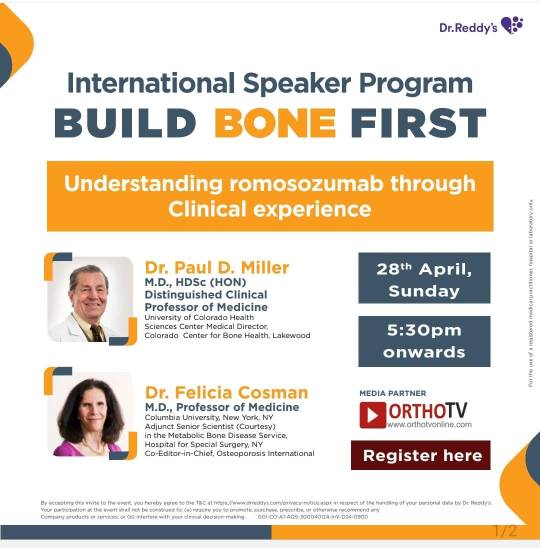
🔰 International Speaker Program BUILD BONE FIRST
🔺 "Understanding romosozumab through Clinical experience
🗓️ Date : Sunday 28 April 2024
🕠 Time : 5:30pm IST
👨💻 Click here to register : https://tinyurl.com/OrthoTV-Evenity
🆓 Registration is free but Mandatory for all
👨⚕️ Dr. Paul D. Miller
M.D., HDSc (HON)
Distinguished Clinical Professor of Medicine
University of Colorado Health
Sciences Center Medical Director,
Colorado Center for Bone Health, Lakewood
👨⚕️ Dr. Felicia Cosman
M.D., Professor of Medicine
Columbia University, New York, NY
Adjunct Senior Scientist (Courtesy)
in the Metabolic Bone Disease Service,
Hospital for Special Surgery, NY
Co-Editor-in-Chief, Osteoporosis International
✅ PROGRAM AGENDA BUILDING BETTER BONES with Romosozumab
🔘 Topic:• Introduction and context setting - Chairperson • Optimising bone health for the very high risk patient with romosozumab - Dr. Felicia Cosman • Chronic kidney disease and Osteoporosis: Use of romosozumab and denosumab - Dr. Paul Miller • Panel discussion - Risk stratification, guidelines and positioning romosozumab in India, Clinical experience sharing and Q & A - Moderator and all other panel members
• 📤Vote of thanks - DRL team
🤝OrthoTV Team: Dr Ashok Shyam, Dr Neeraj Bijlani
📺 Streaming live on OrthoTV
www.orthotvonline.com
▶️ Join OrthoTV - https://linktr.ee/OrthoTV
#BoneHealth#Osteoporosis#Romosozumab#Orthopedics#MedicalEducation#ChronicKidneyDisease#HealthcareConference#ClinicalExperience#MedicalResearch#OrthoTV#HealthcareProfessionals#ContinuingEducation#DRLTeam#ExpertInsights#BuildingBetterBones
0 notes
Text
Hemodialysis: Lifesaving Treatment for Kidney Disease

Hemodiafiltration (HDF), an advanced form of hemodialysis, revolutionizes the treatment landscape for individuals battling advanced Chronic Kidney Disease (CKD). By synergizing diffusion and convection, HDF boasts superior toxin removal, mitigating chronic inflammation and enhancing patient well-being. Unlike traditional hemodialysis, HDF efficiently clears larger molecules, contributing to improved cardiovascular health and better blood pressure control, crucial for CKD patients often grappling with hypertension. Moreover, HDF recipients frequently report reduced fatigue and heightened energy levels, enhancing their quality of life. Despite its merits, HDF presents challenges, including infrastructure costs and patient suitability considerations. However, with meticulous monitoring and management of potential complications, HDF stands as a beacon of hope, offering enhanced treatment efficacy and improved outcomes. As research and technology advance, HDF holds promise for further refining kidney disease management, underscoring its pivotal role in the continuum of care.
Visit Our Website: https://kidneystoneindia.com/hemodialysis-lifesaving-treatment-kidney-disease/
Contact Us: 9942526126
0 notes
Text
instagram
🚨 Don't ignore that discomfort! 🚨
Is it kidney pain or back pain? Sometimes, it's not easy to tell the difference, but knowing can make a big difference in your health!
Kidney pain often manifests as a dull ache on either side of your lower back, while back pain may feel more centralized.
🔍Here's a quick guide to help you distinguish:
1️⃣ Location: Kidney pain typically occurs in the flank area, just below the rib cage, and may radiate to the abdomen or groin. Back pain tends to be centralized in the back, possibly extending down the legs.
2️⃣ Sensations: Kidney pain may feel like a sharp, stabbing sensation or a dull ache, while back pain might be more of aching, throbbing, or stiffness.
3️⃣ Other symptoms: Kidney issues often come with additional symptoms like fever, nausea, vomiting, or changes in urine color (such as pink, red, or brown urine). Back pain may not be accompanied by these symptoms.
📌 If you're experiencing persistent or severe pain, it's crucial to seek medical attention promptly. Ignoring symptoms could lead to worsening conditions. Don't hesitate to consult a healthcare professional to get the right diagnosis and appropriate treatment!
📞 Call us at +91 9900811118 to schedule your appointment or inquire about our services.
#addonhealthcare#addonscanslabs#KidneyDisease#ChronicKidneyDisease#KidneyHealth#RenalFailure#KidneyFailure#reelsinstagram😍#trending#trendingreels#trend#viral#viralreels#Instagram
1 note
·
View note
Text
Swaran Homoeopathic ensures treatment of stage 3 kidney disease | chronic kidney disease
Swaran Homoeopathic's dedication to patient-centered care and their remarkable success in treating stage 3 kidney disease & chronic kidney disease underlines the potential benefits of Homoeopathic medicine in managing this complex condition. With their personalized treatment plans, holistic approach, and emphasis on empowering patients, Swaran Homoeopathic is making a difference in the lives of kidney disease patients worldwide.
For More Information Contact us Now - 9310212429
https://swaranhomoeopathic.com/chronic-kidney-disease-ckd/
H-649/650 Palam extn, Sector-7, Dwarka, Delhi-110075
0 notes
Text
Swaran Homoeopathic ensures treatment of stage 3 kidney disease | chronic kidney disease
Kidney disease is a serious health condition that affects millions of people worldwide. It can have a significant impact on a person's quality of life, leading to symptoms such as fatigue, nausea, and swelling. While there are various treatment options available, Homoeopathic medicine has gained attention for its potential in managing kidney disease. Swaran Homoeopathic, a renowned name in the field, boasts remarkable success in treating stage 3 kidney disease & chronic kidney disease.
Stage 3 kidney disease is a critical phase where the kidneys' function starts to decline significantly. In this stage, patients may experience symptoms like high blood pressure, proteinuria, and reduced glomerular filtration rate (GFR). Traditional medical interventions often focus on managing symptoms and slowing down the progression of the disease. However, Swaran Homoeopathic takes a unique approach by addressing the root causes and providing an effective treatment plan.
Swaran Homoeopathic believes in a holistic approach to healthcare, aiming to restore the body's natural balance and enhance its self-healing abilities. With an experienced team of homeopathic doctors specialized in kidney disease management, Swaran Homoeopathic has achieved remarkable success in treating stage 3 kidney disease & chronic kidney disease.
One of the significant benefits of Swaran Homoeopathic treatment is that it strives to provide personalized care to each patient. The doctors take the time to understand the individual's medical history, lifestyle, and emotional well-being to develop a customized treatment plan. This comprehensive approach goes beyond merely prescribing medications but also encompasses dietary modifications, lifestyle changes, and stress management techniques.
Swaran Homoeopathic treatment for stage 3 kidney disease & chronic kidney disease focuses on improving kidney function, reducing proteinuria, and controlling blood pressure. The homeopathic medicines used in the treatment are carefully selected to target the underlying causes of the disease and stimulate the body's healing response. These medicines are safe, non-toxic, and have no known side effects, making them suitable for long-term use.
Moreover, Swaran Homoeopathic recognizes the importance of a healthy diet in managing kidney disease. They provide patients with detailed dietary guidelines tailored to their specific condition. These guidelines emphasize a low-sodium, low-protein, and low-phosphorus diet to alleviate the burden on the kidneys. Additionally, Swaran Homoeopathic doctors also educate patients on the importance of hydration and maintaining a healthy body weight.
The success stories of patients treated by Swaran Homoeopathic speak volumes about the effectiveness of their treatment approach. Many patients have reported significant improvements in their kidney function, reduction in proteinuria, and even a halt in disease progression. Additionally, patients have also experienced an overall improvement in their well-being, with decreased fatigue, improved appetite, and enhanced vitality.
Swaran Homoeopathic's commitment to providing comprehensive care extends beyond the treatment phase. They offer ongoing support to their patients, ensuring a smooth recovery and long-term management of kidney disease. Regular follow-ups, health monitoring, and patient education programs are some of the ways they strive to empower patients in their journey toward better health.
It is important to note that Homoeopathic treatment, including Swaran Homoeopathic, is not a substitute for conventional medical care. It should be seen as a complementary approach that can work in conjunction with traditional treatments. If you are suffering from stage 3 kidney disease & chronic kidney disease, it is crucial to consult with a medical professional and explore all available treatment options.
Swaran Homoeopathic's dedication to patient-centered care and their remarkable success in treating stage 3 kidney disease & chronic kidney disease underlines the potential benefits of Homoeopathic medicine in managing this complex condition. With their personalized treatment plans, holistic approach, and emphasis on empowering patients, Swaran Homoeopathic is making a difference in the lives of kidney disease patients worldwide.
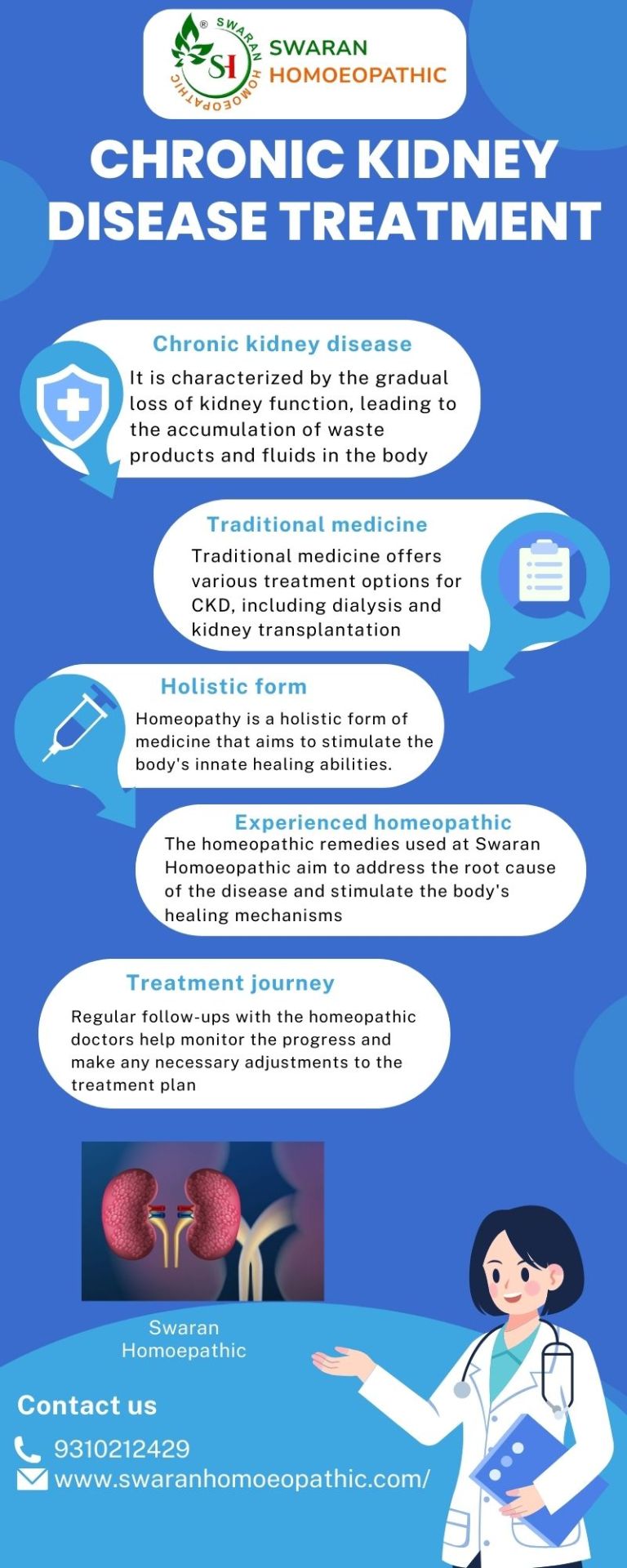
For More Information Contact us Now - 9310212429
https://swaranhomoeopathic.com/chronic-kidney-disease-ckd/
H-649/650 Palam extn, Sector-7, Dwarka, Delhi-110075
0 notes
Text




किडनी हमारे शरीर का मुख्य अंग है, जो शरीर से हानिकारक पदार्थों को बाहर निकालने का काम करता है। तो आइये जानते हैं किडनी को हेल्थी रखने के 3 टिप्स😮
#kidney#kidneydisease#kidneytransplant#kidneyhealth#health#kidneyfailure#kidneystones#kidneys#kidneycancer#kidneydonor#kidneywarrior#kidneydiseaseawareness#kidneystrong#doctor#diabetes#cancer#medicine#urology#kidneyawareness#chronickidneydisease#kidneydiet#medixic#healthylifestyle#natural#nature#organic#nutrition#healthyfood
1 note
·
View note
Text
Discover holistic healing at Svasthvida, India. Consult our Ayurvedic doctors for Chronic Renal Failure, offering personalized care, herbal remedies, and transformative well-being. Trust in our expertise to navigate your journey to renal health. Limited appointments are available. Reclaim vitality with Svasthvida! 🌿🌟
𝐂𝐨𝐧𝐭𝐚𝐜𝐭 𝐔𝐬 𝐭𝐨 𝐁𝐞𝐠𝐢𝐧 𝐘𝐨𝐮𝐫 𝐀𝐲𝐮𝐫𝐯𝐞𝐝𝐢𝐜 𝐇𝐞𝐚𝐥𝐢𝐧𝐠!
➡️𝐂𝐚𝐥𝐥/𝐖𝐡𝐚𝐭𝐬𝐀𝐩𝐩: 099143 21828
➡️𝐄-𝐦𝐚𝐢𝐥: [email protected]
#kidneyhealth#kidneyfailure#bestdoctors#kidneystones#diabetes#kidneys#kidneywarrior#health#ckd#kidneystrong#kidneydonor#kidneydiseaseawareness#organdonation#chronicillness#chronickidneydisease#donatelife#kidneycancer#kidneyawareness#kidneydiet
0 notes
Text

Renew your kidneys naturally with our naturopathic solution - embrace Kidney Basti, Hot Hip Bath, and the exclusive Kidney Pack for a healthier you!💚
...
𝐂𝐨𝐧𝐭𝐚𝐜𝐭 𝐔𝐬 𝐍𝐨𝐰: 𝟖𝟐𝟖𝟕𝟒𝟒𝟓𝟖𝟎𝟖📞
𝐕𝐢𝐬𝐢𝐭 𝐮𝐬 𝐚𝐭 www.sppc.in
𝐥𝐨𝐜𝐚𝐭𝐢𝐨𝐧:- Shanti Marg, Narwana Rd, near Manglam Red Light, Block E West Vinod Nagar, New Delhi, Delhi 110092
#sppc#patanjali#ayurveda#hospital#holistichealth#HolisticHealing#AyurvedicWellness#RespiratoryHealth#NaturalRemedies#WellnessJourney#KidneyHealth#NaturalRenewal#NaturopathySolution#ChronicKidneyDisease#HolisticWellness#renewyourbody#kidneycaretips#HealthyLiving#WellnessJourney2024#NaturalHealing
1 note
·
View note
Text
#kidneydisease#kidneytransplant#kidney#kidneyhealth#kidneyfailure#dialysis#kidneystones#diabetes#kidneys#kidneywarrior#health#ckd#kidneystrong#kidneydonor#kidneydiseaseawareness#organdonation#chronicillness#chronickidneydisease#donatelife#kidneycancer#kidneyawareness#kidneydiet#heartdisease#cancer#nephrology#transplant#kidneyproblems#medicine#giftoflife#kidneyinfection
1 note
·
View note
Text
Exploring the Link Between Diabetes and Kidney Disease: Insights from Dr. Tauseef Ahmed, Nephrologist in Aurangabad
Introduction:
In the complex landscape of healthcare, the intricate relationship between diabetes and kidney disease has garnered significant attention. Dr. Tauseef Ahmed, a distinguished Nephrologist in Aurangabad, delves into the nuanced connection between these two prevalent health conditions, shedding light on preventative measures and optimal management strategies.
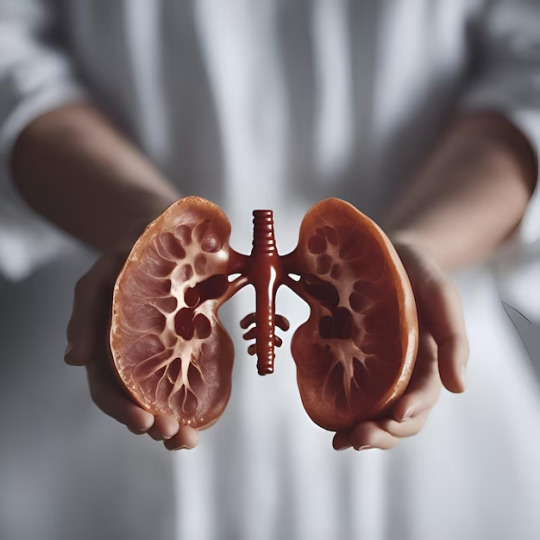
Understanding the Diabetes-Kidney Disease Nexus:
Diabetes, a chronic metabolic disorder characterized by elevated blood sugar levels, poses a substantial risk for kidney disease. Dr. Tauseef Ahmed elucidates that diabetes can inflict damage on the kidneys through several mechanisms, including high blood sugar levels, high blood pressure, and the impact of diabetes-related complications.
The Role of Dr. Tauseef Ahmed:
As the Best Nephrologist in Aurangabad, Dr. Tauseef Ahmed brings a wealth of expertise to the forefront of diabetes-related kidney complications. With a comprehensive approach to patient care, he emphasizes early detection, personalized treatment plans, and proactive measures to mitigate the progression of kidney disease in individuals with diabetes.
Preventative Strategies:
Dr. Tauseef Ahmed advocates for a holistic approach to managing the intricate interplay between diabetes and kidney health. Lifestyle modifications, including a balanced diet, regular exercise, and optimal blood sugar control, form the foundation of preventative strategies. As the Top Nephrologist in Aurangabad, Dr. Ahmed underscores the importance of regular check-ups to monitor kidney function and detect early signs of damage.
Early Detection and Diagnosis:
Timely identification of kidney disease in individuals with diabetes is crucial. Dr. Tauseef Ahmed employs advanced diagnostic tools and techniques to assess kidney function comprehensively. Regular monitoring of urine albumin levels, glomerular filtration rate (GFR), and blood pressure is integral to detecting and managing kidney complications early on.
Personalized Treatment Plans:
Recognizing that each patient's journey is unique, Dr. Tauseef Ahmed tailors treatment plans to address specific needs and challenges. Whether through medication management, dietary adjustments, or specialized interventions, his approach as the Best Nephrologist in Aurangabad is rooted in patient-centric care.
Managing Hypertension:
Hypertension often accompanies both diabetes and kidney disease, exacerbating the risk of complications. Dr. Tauseef Ahmed employs a multifaceted strategy to control blood pressure, emphasizing lifestyle modifications, medication, and regular monitoring to safeguard kidney function.
Innovative Therapies and Interventions:
As a leading Nephrologist in Aurangabad, Dr. Tauseef Ahmed stays abreast of cutting-edge therapies and interventions. From renal replacement therapies to novel medications, he explores innovative avenues to enhance the quality of life for individuals grappling with the dual challenges of diabetes and kidney disease.
Educational Initiatives:
Dr. Tauseef Ahmed is not only committed to treating patients but also to educating the community about the intricacies of diabetes-related kidney complications. Through workshops, seminars, and informational sessions, he empowers individuals to take charge of their health and adopt proactive measures to prevent kidney disease progression.
Patient Success Stories:
The impact of Dr. Tauseef Ahmed's expertise is evident in the success stories of his patients. Many individuals under his care have experienced improved kidney function, enhanced quality of life, and better management of diabetes-related complications.
Collaborative Approach to Care:
Recognizing the multidimensional nature of diabetes and kidney disease, Dr. Tauseef Ahmed collaborates seamlessly with a network of healthcare professionals. His integrative approach ensures that patients receive comprehensive care, addressing not only nephrological concerns but also the broader spectrum of health factors influencing diabetes management.
Conclusion:
In the realm of diabetes-related kidney complications, Dr. Tauseef Ahmed emerges as the beacon of expertise in Aurangabad. As the Top Nephrologist in Aurangabad, his commitment to patient well-being, emphasis on preventative strategies, and dedication to advancing kidney care solidify his position as a healthcare luminary in the region. By exploring the intricate link between diabetes and kidney disease, Dr. Tauseef Ahmed empowers individuals to navigate these health challenges with resilience and optimism, paving the way for a healthier future.
#nephrologist#nephrology#kidneydisease#kidneyhealth#dialysis#kidney#kidneyfailure#kidneytransplant#kidneycare#kidneystones#chronickidneydisease#doctor#ckd#kidneydoctor#healthcare#kidneydiseaseawareness#kidneyspecialist#health#kidneyinfection#kidneyfacts#kidneyawareness#kidneystone#healthylifestyle#kidneydiet#doctors#kidneys#kidneywarrior#hemodialysis#diabetes#kidneytreatment
0 notes
Text
Unlocking the Power of Amino Acids: Exploring their Role in Managing Chronic Diseases

Chronic diseases are long-term health conditions that require ongoing management and care. They often develop slowly and persist over a prolonged period, impacting various aspects of a person's life. Examples of chronic diseases include heart disease, diabetes, cancer, and neurodegenerative disorders.
Nutrition plays a crucial role in managing chronic diseases. A well-balanced diet can help control symptoms, prevent complications, and improve overall health and quality of life. By making informed food choices, individuals can support their immune system, manage their weight, and reduce the risk of developing or exacerbating chronic diseases.
Amino acids are the fundamental components that make up proteins, which are vital for various biological processes in the body. They play a significant role in tissue repair, hormone production, and immune function. Amino acids are also involved in the maintenance and repair of cells, making them potentially influential in the development and management of chronic diseases.

Understanding Amino Acids
Amino acids are organic compounds that serve as the building blocks of proteins. They play crucial roles in the body's structure, function, and overall health. Amino acids are involved in processes such as tissue repair, enzyme production, hormone synthesis, and immune system function. They are essential for the growth, maintenance, and repair of cells and tissues in the body.
There are two main categories of amino acids: essential and non-essential. Essential amino acids cannot be produced by the body and must be obtained through the diet. They include amino acids like valine, leucine, and lysine. Non-essential amino acids, on the other hand, are naturally produced by the body and do not need to be obtained from dietary sources.
Dietary protein is a primary source of amino acids. When we consume protein-rich foods such as meat, fish, dairy, legumes, and nuts, our bodies break down the proteins into individual amino acids. These amino acids are then used by the body to build and repair tissues, synthesize enzymes and hormones, and carry out other essential functions. Adequate intake of dietary protein ensures a sufficient supply of amino acids for these vital processes in the body.

Amino Acids and Chronic Disease
There is growing interest in understanding how amino acids may impact chronic diseases. Research suggests that certain amino acids may play a role in disease development, progression, and management. By studying their effects, scientists aim to uncover potential therapeutic interventions and preventive strategies for chronic diseases.
Several amino acids have garnered attention for their potential effects on chronic diseases. For example, arginine has been studied for its potential benefits in cardiovascular health, while glutamine has been explored for its role in supporting immune function. Cysteine, another amino acid, has shown promise in antioxidative and anti-inflammatory properties. These amino acids and others are being investigated to determine their potential impact on various chronic diseases.
The mechanisms by which amino acids influence chronic diseases are still being investigated. Amino acids can modulate cellular processes, such as inflammation, oxidative stress, and metabolic pathways, which are associated with chronic disease development and progression. By affecting these underlying mechanisms, amino acids may potentially influence the course of chronic diseases and contribute to their management.
Remember to consult with healthcare professionals and rely on scientific studies for personalized advice or information regarding specific chronic diseases and amino acid supplementation.
Amino Acids and Chronic Kidney Disease
Chronic kidney disease (CKD) is a condition characterized by the progressive loss of kidney function. Amino acids play a crucial role in the metabolism and regulation of plasma concentrations in the kidneys. The article "Amino acids and the kidney" by G.A. Young (1991) explores the relationship between amino acids and kidney function in more detail (PMID: 24194102, DOI: 10.1007/BF00806915).
The kidneys are responsible for reabsorbing approximately 70g/day of amino acids from both the diet and metabolism in other tissues. This reabsorption process is essential for maintaining amino acid balance in the body. Amino acids have various functions in the kidneys, including regulating haemodynamics, proteolysis, and preserving kidney integrity.
In patients with chronic kidney failure, abnormalities in plasma and muscle amino acid profiles have been observed. This includes low levels of essential amino acids and tyrosine, along with high levels of nonessential amino acids. These altered profiles initially indicate malnutrition, which can be partially corrected through amino acid supplementation.
Studies have also investigated the impact of chronic kidney failure on specific amino acid metabolic processes. For example, in normal kidney function, glutamine uptake helps maintain acid-base homeostasis, while glycine and citrulline are removed, and serine and arginine are released into circulation. However, these metabolic processes are impaired in individuals with chronic kidney failure.
Furthermore, CKD is associated with uremia, which affects multiple tissues and can lead to malnutrition. Acidosis, a common condition in CKD, activates catabolism of amino acids and proteins in muscle. Hyperinsulinemia, often present in CKD, may also contribute to the depression of plasma branched-chain amino acids, particularly valine. These abnormalities may not be fully responsive to dietary supplementation.
In conclusion, the article emphasizes the role of amino acids in the metabolism and regulation of plasma concentrations in the kidneys. In chronic kidney disease, abnormalities in amino acid profiles and metabolic processes are observed, indicating the importance of considering amino acid supplementation as part of the management strategy. Further research on the specific effects of amino acids and their supplementation in CKD is warranted to optimize treatment outcomes.
Amino Acids and Chronic Cardiovascular Disease
Chronic cardiovascular disease (CVD) is a leading cause of mortality worldwide. Recent research has shed light on the role of amino acids in the development and progression of CVD. Several studies have investigated the relationship between amino acids and chronic cardiovascular disease. A growing body of evidence suggests that amino acids play a crucial role in the pathogenesis of chronic cardiovascular disease.
Hu et al.1 conducted a trans-ancestry Mendelian randomization analysis and found significant causal relationships between circulating amino acid levels and various CVDs. This study provides valuable insights into the potential use of amino acids as biomarkers and therapeutic targets for CVD.
Yuan et al.2 investigated the association between amino acid metabolites and prediabetes progression and found that specific amino acid profiles were associated with an increased risk of prediabetes. These findings highlight the importance of amino acid metabolism in the early stages of CVD development.
Asosingh et al.3 focused on patients with chronic heart failure and identified distinct amino acid signatures associated with disease severity and patient survival. This study suggests that measuring specific amino acids could potentially aid in risk stratification and personalized treatment approaches for heart failure patients.
Fukuda et al.4 explored the therapeutic potential of dietary essential amino acids in the treatment of heart failure with reduced ejection fraction. Their findings indicate that supplementation with specific amino acids may improve cardiac function and clinical outcomes in heart failure patients.
Saito et al.5 investigated aberrant branched-chain amino acid catabolism in cardiovascular diseases and its potential implications. They highlighted the dysregulation of branched-chain amino acid metabolism as a potential mechanism contributing to CVD pathogenesis.
References :
- "Causal relationships of circulating amino acids with cardiovascular disease: a trans-ancestry Mendelian randomization analysis" by Song Hu et al.
- "Amino Acid Metabolites and Prediabetes Progression: A Case-Control Study Nested within the Singapore Chinese Health Study" by Jian-Min Yuan et al.
- "Amino Acid Signatures in Patients with Chronic Heart Failure and Their Impact on Survival" by Kewal Asosingh et al.
- "Dietary Essential Amino Acids for the Treatment of Heart Failure with Reduced Ejection Fraction" by Masato Fukuda et al.
- "Aberrant Branched-Chain Amino Acid Catabolism in Cardiovascular Diseases" by Hiroshi Saito et al.
In addition to confirming the relationship between amino acids and chronic cardiovascular disease (CVD), the studies discussed provide valuable insights that can potentially contribute to the improvement of CVD management. Here are some key insights from these studies:
- Biomarkers for Risk Assessment: The research by Hu et al.1 and Asosingh et al.3 identified specific amino acid profiles associated with CVD risk and disease severity. These findings suggest that measuring circulating amino acid levels could serve as biomarkers for risk assessment and patient stratification in CVD. By identifying individuals at higher risk, healthcare professionals can implement proactive interventions and personalized treatment strategies.
- Therapeutic Targets: The study by Fukuda et al.4 explored the therapeutic potential of dietary essential amino acids in heart failure with reduced ejection fraction. Their findings suggest that targeted amino acid supplementation may improve cardiac function and clinical outcomes in heart failure patients. This highlights the potential of amino acids as therapeutic targets for CVD management.
- Understanding Metabolic Dysregulation: The investigations by Hu et al.1 and Saito et al.5 shed light on the dysregulation of amino acid metabolism in CVD. By identifying specific amino acids associated with CVD and aberrant metabolic pathways, these studies provide insights into the underlying mechanisms of CVD pathogenesis. This knowledge can guide the development of targeted interventions and therapies aimed at restoring metabolic balance.
- Mendelian Randomization Analysis: Hu et al.1 utilized a trans-ancestry Mendelian randomization analysis to establish causal relationships between circulating amino acids and CVD. This approach helps overcome confounding factors and reverse causation biases commonly observed in observational studies. The use of Mendelian randomization strengthens the evidence for causality and provides more robust insights into the role of amino acids in CVD.
- Personalized Treatment Approaches: The studies collectively suggest that individual amino acid profiles may have implications for personalized treatment approaches in CVD. By identifying specific amino acid imbalances or deficiencies, clinicians can tailor interventions to address the unique metabolic needs of each patient. This personalized approach may lead to more effective and targeted interventions, potentially improving patient outcomes in CVD management.
In conclusion, the insights gained from these studies offer potential benefits for the improvement of chronic cardiovascular disease management. By utilizing amino acids as biomarkers, identifying therapeutic targets, understanding metabolic dysregulation, employing Mendelian randomization analysis, and adopting personalized treatment approaches, healthcare professionals can optimize CVD care and potentially enhance patient outcomes.
Dietary Strategies for Optimizing Amino Acid Intake
Incorporating amino acids into a healthy diet can be achieved through simple and practical steps. One effective approach is to include a variety of protein-rich foods in your meals and snacks. This can include lean meats, poultry, fish, eggs, legumes, dairy products, and plant-based protein sources like tofu or tempeh. Aim to include protein-rich foods in each meal to ensure a steady supply of amino acids throughout the day.

To optimize amino acid intake, focus on consuming protein-rich foods that contain all essential amino acids. These complete protein sources can provide a wide range of amino acids needed for various bodily functions. Excellent sources of complete proteins include animal-based foods like beef, chicken, fish, eggs, and dairy products. Plant-based sources such as quinoa, buckwheat, soybeans, and chia seeds are also good options for obtaining essential amino acids.

While amino acids play a crucial role in the body, it is important to remember that they are just one component of a balanced and nutritious diet. Aiming for overall dietary balance is essential for optimal health. Consulting with a healthcare professional or registered dietitian can provide personalized guidance based on your specific needs, preferences, and any underlying health conditions. They can help you develop a meal plan that ensures adequate amino acid intake while considering other important nutrients and dietary factors.
Remember to prioritize a well-rounded diet that includes a variety of nutrient-dense foods to support overall health. By incorporating protein-rich sources that are high in essential amino acids into your diet and seeking professional guidance, you can optimize your amino acid intake and promote a balanced nutritional approach.
Lifestyle Factors and Chronic Disease Management
Managing chronic diseases requires a comprehensive approach that goes beyond nutrition alone. Lifestyle factors like regular exercise, effective stress management, and sufficient sleep play a vital role in supporting overall health and complementing the benefits of amino acids. Engaging in regular physical activity can improve cardiovascular health, enhance insulin sensitivity, and promote weight management. Practicing stress management techniques, such as meditation or deep breathing exercises, can help reduce the negative impact of stress on chronic diseases. Additionally, prioritizing adequate sleep is crucial for optimal immune function, hormone regulation, and overall well-being. Combining the benefits of amino acids with a healthy lifestyle can contribute to better disease management outcomes.
Proper nutrition, including adequate amino acid intake, plays a fundamental role in supporting overall health and well-being. Amino acids are essential for numerous bodily functions, including tissue repair, hormone synthesis, and immune function. Optimal amino acid intake, obtained through a well-balanced diet, can support muscle growth and maintenance, aid in wound healing, and contribute to a strong immune system. Additionally, amino acids are involved in neurotransmitter production, influencing mood and cognitive function. By ensuring adequate amino acid intake alongside a balanced diet, individuals can support their overall health and well-being.
Conclusion
Amino acids play a crucial role in managing chronic diseases such as chronic kidney disease and cardiovascular disease. They are essential for various biological functions, including tissue repair, hormone synthesis, and immune function. Research suggests that specific amino acids may have beneficial effects on kidney function, proteinuria reduction, endothelial function, blood flow, and blood pressure regulation. Additionally, amino acids contribute to muscle maintenance, wound healing, and overall well-being.
Prioritizing a balanced diet that includes protein-rich foods can help ensure an adequate intake of essential amino acids. It is important to consult with healthcare professionals, such as nephrologists, cardiologists, or registered dietitians, who can provide personalized advice based on individual health conditions, nutritional needs, and medication interactions. They can guide individuals in optimizing their amino acid intake while considering other dietary factors and overall well-being.
Amino acid research continues to evolve, and future developments hold promise for chronic disease prevention and treatment. Ongoing studies are exploring the optimal dosages, duration, and long-term effects of amino acid supplementation in managing chronic diseases. Additionally, the understanding of how amino acids interact with lifestyle factors, such as exercise, stress management, and sleep, may provide further insights into effective strategies for disease management. Continued research in the field of amino acids and chronic diseases may unveil new interventions and approaches to improve outcomes and enhance overall health.
In conclusion, amino acids play a vital role in managing chronic diseases, and incorporating them into a balanced diet can have positive effects on overall health. By seeking professional guidance and staying informed about the latest research, individuals can make informed decisions and optimize their nutritional strategies for chronic disease prevention and treatment.
Read the full article
#aminoacidsforheartfailure#Branched-ChainAminoAcids#chroniccardiovasculardisease#chronicdisease#chronicdiseasemanagement#chronickidneydisease#chronickidneydiseasediet
0 notes
Text
🌟The Impact of Diabetes on Kidney Health🌟
🩺Did you know that diabetes can significantly affect your kidney health?
1️⃣ Diabetes can harm the small blood vessels in your kidneys, affecting their ability to filter waste from your blood.
2️⃣ Individuals with diabetes are at a higher risk of developing kidney disease, known as diabetic nephropathy.
3️⃣ Over time, high blood sugar levels can lead to progressive kidney damage, potentially leading to kidney failure.
🩸Managing your blood sugar levels, blood pressure, and leading a healthy lifestyle can help prevent or delay kidney complications associated with diabetes.
💉 If you have diabetes, it's crucial to regularly monitor your kidney function through urine tests and blood tests as recommended by your healthcare provider.
⏰ Remember, early detection and proactive management are key in preserving your kidney health while living with diabetes.
Spread awareness by sharing this post with your loved ones! 💙
📣 Secure your Kidney Checkup Appointment Today! 📞 Dial +91 9900811118 to arrange your consultation.
Your kidneys play a crucial role in your well-being, and detecting issues early can have a significant impact
#addonhealthcare#addonscanslabs#KidneyDisease#ChronicKidneyDisease#KidneyHealth#RenalFailure#KidneyFailure#reelsinstagram😍#trending#trendingreels#trend#viral#viralreels
1 note
·
View note
Text

Chronic kidney disease treatment at Swaran Homoeopathic
Swaran Homoeopathic ensures patients receive ongoing support and guidance throughout their treatment journey. Regular follow-ups with the homeopathic doctors help monitor the progress and make any necessary adjustments to the treatment plan. The center also emphasizes the importance of lifestyle modifications, such as adopting a healthy diet, managing stress, and engaging in regular exercise, to support kidney health and overall well-being.
The success stories of patients who have undergone homeopathic treatment at Swaran Homoeopathic are a testament to the effectiveness of this approach. Many patients have reported improvements in kidney function, reduction in symptoms, and an overall improvement in their quality of life. While homeopathy may not be a cure for chronic kidney disease, it can certainly make a significant difference in managing the condition and slowing down its progression.
If you or someone you know is struggling with chronic kidney disease, it may be worth considering homeopathic treatment at Swaran Homoeopathic. Best homeopathic doctor Dr. Amit Mehta with their team of dedicated homeopathic doctors, personalized approach, and commitment to patient well-being makes them a trusted choice in the field. By combining the best of traditional and alternative medicine, Swaran Homoeopathic offers hope to those seeking an effective and holistic approach to chronic kidney disease treatment.
For More Information Contact us Now - 9310212429
H-649/650 Palam extn, Sector-7, Dwarka, Delhi-110075
1 note
·
View note
Text
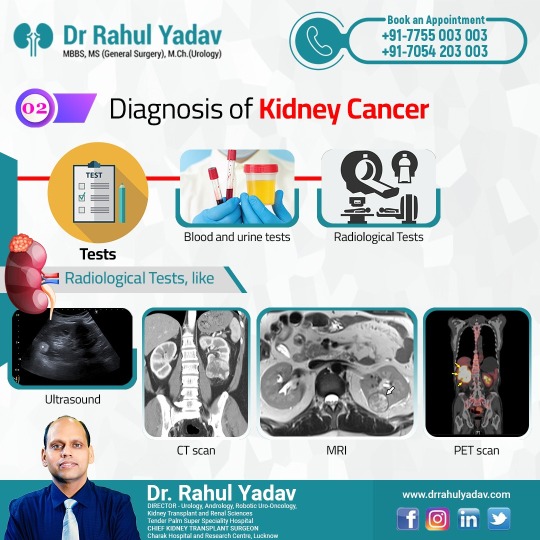
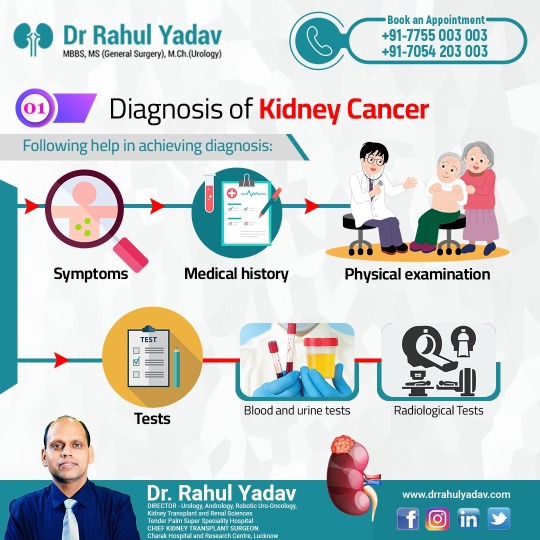
Diagnosis of Kidney Cancer
Following help in achieving diagnosis:
Symptoms
Medical history
Physical examination
TEST
Blood and urine tests
Radiological Tests
𝐁𝐨𝐨𝐤 𝐘𝐨𝐮𝐫 𝐀𝐩𝐩𝐨𝐢𝐧𝐭𝐦𝐞𝐧𝐭: +91 77550 03003
Visit - https://drrahulyadav.com/
Follow on Social Media
https://www.facebook.com/drrahulyadavurologistindia
https://www.instagram.com/drrahulyadavofficial/
https://twitter.com/DrRahulYadav77
https://www.linkedin.com/in/dr-rahul-yadav-242481142/
https://www.youtube.com/@DrRahulYadav
#kidneydisease#chronickidneydisease#kidneydiseaseawareness#CKD#Dialysis#kidneyproblem#kidneytransplant#RCC#RenalCellCarcinoma#HealthFacts
0 notes